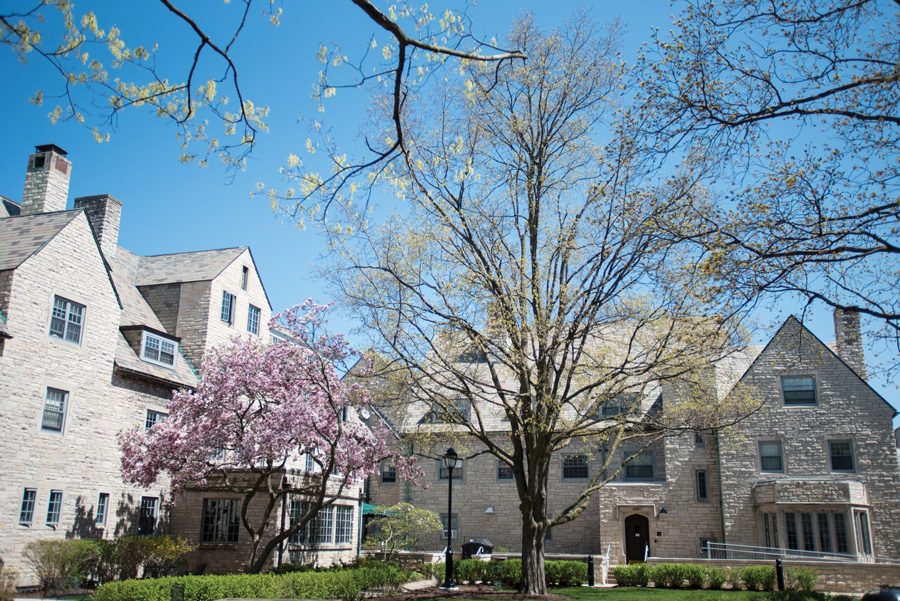Overlooked: Low-income students in Greek Life struggle with clash between various identities
Daily file photo by Colin Boyle
Northwestern’s sorority quad. Delegates from Panhellenic Association chapters recently voted to cancel 2020-21 formal recruitment.
May 10, 2019
This article is the second in “Overlooked,” a series that explores the experiences of underrepresented groups in different spaces on campus.
Rachel Kwak was invited to a birthday dinner for one of her sorority sisters when she explained that she couldn’t afford to join them. One fellow sorority member suggested she not look at her bank account and enjoy the night without being stressed.
“It was at a time when I didn’t even have funds for textbooks that week,” Kwak said. “Her intention was obviously well-meaning but the impact was that she has the privilege to not look at her bank account whereas I don’t.”
Being in a fraternity or sorority and coming from a low-income background are not incompatible at Northwestern, but for Kwak, a SESP sophomore, the balance of these often competing identities has proven too much to handle.
Kwak has been in Gamma Phi Beta since her first year, but said she is planning to deactivate this spring after she experienced microaggressions related to her racial and socioeconomic identities.
Kwak’s experience is not irregular. Being a racial and socioeconomic minority in an Interfraternity Council fraternity or a Panhellenic Association sorority can be a struggle.
Weinberg sophomore Sonali Patel, who recently also joined Gamma Phi Beta, said she noticed how class and race played a part during recruitment. Patel has immigrant parents from India and Zambia, and said she didn’t want to be a “token minority.”
Patel said she was also immediately aware of the “socioeconomic hierarchies” between sororities. Coming from a low-income background, she has decided to work extra hours this quarter at her work-study job to keep up with sorority expenses. She said some students don’t have to consider the price of dues during the recruitment, upholding the clandestine standard of not disclosing prices.
“They’re not very transparent when it comes to dues, because scaring a lot of kids off by money is probably not the best way to recruit people,” Patel said. “You’re told that no one is looking at the way you look or what you’re wearing but you know for certain sororities that’s exactly what they’re doing.”
Kwak has noticed the issues of race and class are interconnected with her experiences in her sorority. She said the continued tradition of allowing legacy sisters into the sorority was problematic because, in the past, they were all-white spaces, meaning legacies were almost exclusively white.
Those spaces can often struggle to be inclusive for underrepresented students.
Kwak said she’s been confused with the only other Korean American woman in her pledge class several times. When she was rushing, she said people often assumed she was an international student because she was Asian.
“Essentially, I underestimated what it’s like to be a woman of color in such a white space,” Kwak said. “I went into a specific chapter and they kept telling me we have a lot of international sisters at this chapter. That’s really cool, but I’m from Nashville, Tennessee.”
While low-income students struggle with feeling welcomed in these spaces, they still stand to gain from joining these organizations.
SESP sophomore Andrew Duarte said that while there was a disconnect between his experiences as a first generation low-income student and his Delta Chi brothers, he felt he had benefited from joining the fraternity.
Duarte said he has grown academically by being around other men studying in the common areas of the fraternity, as it’s easy to slack off when studying alone. He also said he has met a lot of men who he wouldn’t have otherwise and has been inspired by their stories.
“I love hearing about experiences of them traveling because it makes me want to travel. It pushes me,” Duarte said. “I didn’t have this childhood growing up, but that doesn’t mean my children won’t.”
Duarte said his older brother was also in a fraternity at Northwestern and was able to assist him in reaching out and applying to financial programs to lower the costs. Duarte was appreciative of this support, but thought it “sad” that other students might not know about the financial assistance Northwestern provides for Greek Life activities
The Student Activities Assistance Fund has helped 173 students specifically for affording Greek Life this school year, Joe Lattal, the assistant director of Student Organizations & Activities said in an email to The Daily.
SAAF has existed since 2012 and is now implemented through the Student Enrichment Services OneForm to accommodate student organization related expenses for low-income students. Applications involve brief essays and a detailed explanation on how much money is being requested and what the money would be used for.
Travis Martin, the Office of Fraternity and Sorority Life director, said in an email to The Daily that IFC and PHA have their own funds independent of SAAF. Before 2012, the funds through IFC and PHA were the primary source to fund low-income students’ participation in Greek Life.
Kwak said she was able to afford her dues to a combination of both funds, which she found “amazing” that it was an option at Northwestern.
As her time in a sorority winds down, she said she thought she could have made a bigger change in the system. She said she hoped to be able to expose some of the women to people with lower-income backgrounds with whom they might have never interacted.
“I thought maybe naively that I can make that change from the inside out,” Kwak said. “But for a system established for as long as it has been and what it’s rooted in, it’s going to take a lot more than four years of someone’s undergrad career to truly create sustainable change.”
Email: [email protected]
Twitter: @bonijos_iahfant
Related Stories:
– Overlooked: Female engineers struggle with lack of equity, but find solidarity with female professors


